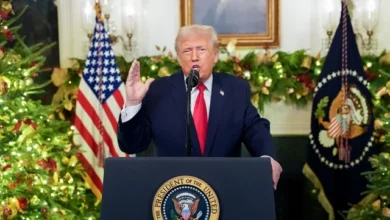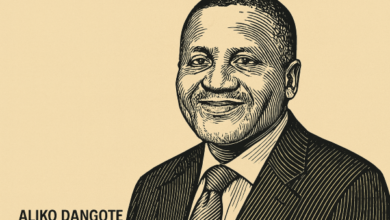Mark Carney’s Liberals Clinch Victory in Canada, Rewriting Political Playbook Amid Trump Turbulence

Mark Carney’s Liberals Clinch Victory in Canada, Rewriting Political Playbook Amid Trump Turbulence
In a stunning political reversal shaped as much by Washington’s aggression as by Ottawa’s resilience, Mark Carney’s Liberal Party has emerged victorious in Canada’s federal election, toppling the populist momentum that had briefly made Pierre Poilievre the presumptive prime minister-in-waiting.
The election outcome — projected by CBC on Tuesday morning — confirmed a historic upset: not only did Carney’s Liberals outperform expectations across the country, they also unseated Poilievre himself, stripping the Conservative firebrand of his parliamentary seat in Ottawa. The loss marks a dramatic fall from grace for a man many pundits had already begun describing as “Canada’s Trump.”
Trump’s Shadow Over Canada: Catalyst for Carney’s Rise
What changed the tide? According to political observers and early postmortems, U.S. President Donald Trump’s belligerent rhetoric and actions played a decisive role. His threats to annex Canada, coupled with a sudden trade war targeting key Canadian exports, sparked national outrage and reframed the election into a battle over sovereignty, national identity, and economic security.
Trump’s unprecedented statement that Canada should become “America’s 51st state” inflamed nationalist sentiment and gave Carney — a soft-spoken technocrat and former central banker — the rare opportunity to occupy both the high ground of competence and the emotional core of Canadian patriotism.
“We are over the shock of the American betrayal,” Carney declared in his victory speech. “But we should never forget the lessons… President Trump is trying to break us so America can own us. That will never ever happen.”
From Technocrat to Statesman: Carney’s Calculated Pivot
Mark Carney’s ascension is no accident. A former Governor of the Bank of Canada and the Bank of England, he is internationally respected for his economic stewardship and climate advocacy. His candidacy was once seen as bloodless and cerebral — ill-suited to combat the populist fire of Poilievre’s “Canada First” movement.
But Trump’s interference gave Carney a platform to pivot from policy wonk to statesman, presenting himself as the only adult in the room with the experience to shield Canada from an increasingly erratic southern neighbor. His messaging combined sober realism with steely resolve, crystallising around themes of national defence, economic independence, and global repositioning.
In contrast, Poilievre’s mimicking of Trumpian tactics — from sloganism to inflammatory rhetoric — backfired spectacularly. What once resonated as “authentic” began to appear reckless in the face of external threats.
Parliament Math: Majority Still Unclear
With 343 seats in Parliament, the Liberals were leading or elected in 168 ridings when Elections Canada temporarily paused counting of special ballots. An outright majority requires 172 seats. Officials noted that remaining ballots — cast by Canadians outside their districts — could affect results in a dozen constituencies.
As it stands, Carney may still need support from smaller parties to pass legislation and govern effectively. However, the moral authority of the win, and the decisive defeat of Poilievre, gives him a powerful mandate in the eyes of voters and international allies alike.
Nigeria Reacts: Tinubu Welcomes New Era in Canada
Nigeria’s President Bola Ahmed Tinubu was among the first world leaders to congratulate Carney. In a statement issued by presidential spokesman Bayo Onanuga, Tinubu lauded the Liberal victory and emphasized the potential for renewed bilateral relations.
“The President hopes that Carney’s banking and governance experience will guide his country at this crucial moment,” the statement read.
“Nigeria is committed to deepening ties with Canada in areas such as education, climate change, and migration.”
Tinubu’s early outreach also signals Africa’s strategic interest in Canada’s evolving foreign policy, particularly in light of Carney’s reputation as a global thinker on sustainability and development.
BRANDECONOMY Analysis: The Global Stakes of a Domestic Election
This Canadian election, while domestic in execution, was global in implication. It raises important questions about how U.S. political volatility is reshaping the geopolitical calculations of its closest allies.
- For Canada, the result is both a rebuke of right-wing populism and a sober recalibration of its post-American future.
- For Carney, it’s a test of whether elite competence can triumph in an age of emotional politics — and whether he can turn moral authority into legislative momentum.
- For the world, especially smaller economies like Nigeria, it is a signal that liberal democracy and multilateral diplomacy still have a pulse, even in the era of MAGA expansionism.
Bottom Line
Mark Carney didn’t just win an election — he may have redefined the rules of 21st-century politics. Against the backdrop of external coercion and internal division, his victory is a case study in how calm, credible leadership can still prevail — if the stakes are made clear enough to voters.
The next challenge? Turning that electoral clarity into enduring national strategy.
In a stunning political reversal shaped as much by Washington’s aggression as by Ottawa’s resilience, Mark Carney’s Liberal Party has emerged victorious in Canada’s federal election, toppling the populist momentum that had briefly made Pierre Poilievre the presumptive prime minister-in-waiting.
The election outcome — projected by CBC on Tuesday morning — confirmed a historic upset: not only did Carney’s Liberals outperform expectations across the country, they also unseated Poilievre himself, stripping the Conservative firebrand of his parliamentary seat in Ottawa. The loss marks a dramatic fall from grace for a man many pundits had already begun describing as “Canada’s Trump.”
Trump’s Shadow Over Canada: Catalyst for Carney’s Rise
What changed the tide? According to political observers and early postmortems, U.S. President Donald Trump’s belligerent rhetoric and actions played a decisive role. His threats to annex Canada, coupled with a sudden trade war targeting key Canadian exports, sparked national outrage and reframed the election into a battle over sovereignty, national identity, and economic security.
Trump’s unprecedented statement that Canada should become “America’s 51st state” inflamed nationalist sentiment and gave Carney — a soft-spoken technocrat and former central banker — the rare opportunity to occupy both the high ground of competence and the emotional core of Canadian patriotism.
“We are over the shock of the American betrayal,” Carney declared in his victory speech. “But we should never forget the lessons… President Trump is trying to break us so America can own us. That will never ever happen.”
From Technocrat to Statesman: Carney’s Calculated Pivot
Mark Carney’s ascension is no accident. A former Governor of the Bank of Canada and the Bank of England, he is internationally respected for his economic stewardship and climate advocacy. His candidacy was once seen as bloodless and cerebral — ill-suited to combat the populist fire of Poilievre’s “Canada First” movement.
But Trump’s interference gave Carney a platform to pivot from policy wonk to statesman, presenting himself as the only adult in the room with the experience to shield Canada from an increasingly erratic southern neighbor. His messaging combined sober realism with steely resolve, crystallising around themes of national defence, economic independence, and global repositioning.
In contrast, Poilievre’s mimicking of Trumpian tactics — from sloganism to inflammatory rhetoric — backfired spectacularly. What once resonated as “authentic” began to appear reckless in the face of external threats.
Parliament Math: Majority Still Unclear
With 343 seats in Parliament, the Liberals were leading or elected in 168 ridings when Elections Canada temporarily paused counting of special ballots. An outright majority requires 172 seats. Officials noted that remaining ballots — cast by Canadians outside their districts — could affect results in a dozen constituencies.
As it stands, Carney may still need support from smaller parties to pass legislation and govern effectively. However, the moral authority of the win, and the decisive defeat of Poilievre, gives him a powerful mandate in the eyes of voters and international allies alike.
Nigeria Reacts: Tinubu Welcomes New Era in Canada
Nigeria’s President Bola Ahmed Tinubu was among the first world leaders to congratulate Carney. In a statement issued by presidential spokesman Bayo Onanuga, Tinubu lauded the Liberal victory and emphasized the potential for renewed bilateral relations.
“The President hopes that Carney’s banking and governance experience will guide his country at this crucial moment,” the statement read.
“Nigeria is committed to deepening ties with Canada in areas such as education, climate change, and migration.”
Tinubu’s early outreach also signals Africa’s strategic interest in Canada’s evolving foreign policy, particularly in light of Carney’s reputation as a global thinker on sustainability and development.
BRANDECONOMY Analysis: The Global Stakes of a Domestic Election
This Canadian election, while domestic in execution, was global in implication. It raises important questions about how U.S. political volatility is reshaping the geopolitical calculations of its closest allies.
- For Canada, the result is both a rebuke of right-wing populism and a sober recalibration of its post-American future.
- For Carney, it’s a test of whether elite competence can triumph in an age of emotional politics — and whether he can turn moral authority into legislative momentum.
- For the world, especially smaller economies like Nigeria, it is a signal that liberal democracy and multilateral diplomacy still have a pulse, even in the era of MAGA expansionism.
Bottom Line
Mark Carney didn’t just win an election — he may have redefined the rules of 21st-century politics. Against the backdrop of external coercion and internal division, his victory is a case study in how calm, credible leadership can still prevail — if the stakes are made clear enough to voters.
The next challenge? Turning that electoral clarity into enduring national strategy.












